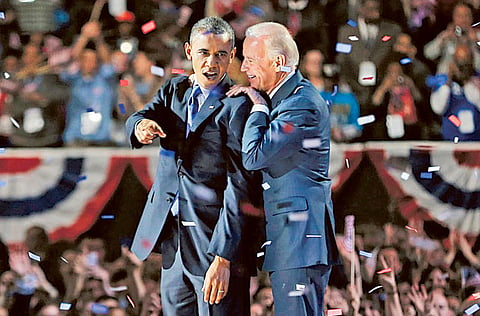Biden must not repeat Obama’s mistakes
Bidenomics should focus on four key rules to lead America

Here we go again. For the second time in 12 years a newly elected Democratic president is inheriting an economy in deep distress. And while it’s hard to focus on such things after the recent Trumpist putsch, a lot depends on whether Joe Biden’s plan to deal with our economic woes is effective.
The narrow Democratic margin in Congress means that the most ambitious progressive goals will have to be put on hold. But the rescue package Biden unveiled already indicates he won’t exhibit the excessive caution that inhibited President Barack Obama’s response to economic crisis.
Still, in case anyone on the Biden team is feeling cautious, let me offer four rules, based on hard experience, that should encourage them to be bold in dealing with the mess we’re in.
Biden can’t expect any significant help in governing from the modern Republican Party — a party that for the most part spent two months refusing to accept clear-cut election results, with many members of Congress still voting to reject electoral votes even after a mob sacked the Capitol

Rule No. 1: The last time Democrats took the White House, they were still in something of a reflexive cringe, halfway accepting the conservative dogma that government always does more harm than good. But everything that has happened since 2009 says that government spending can be hugely beneficial.
Remember how Republicans denounced Obamacare, with some of them comparing it to slavery? As it turned out, despite its flaws, the Affordable Care Act led to a drastic decline in the number of Americans without health insurance, and it gave many people a new sense of security in the knowledge that they couldn’t be cut off because of pre-existing conditions. Republican attempts to repeal the ACA were a major reason Democrats now control Congress.
More recently, the CARES Act, which provided aid to businesses, expanded unemployment benefits, gave out checks and more, greatly alleviated the damage from the pandemic — poverty may even have gone down while the act was in full effect.
Making economy hot again
Biden is seeking another major relief package, including a new effort to reduce child poverty, and he may soon move to make the ACA more generous and cover more people. He should push hard on both fronts: Recent experience shows that smart government spending can do a lot to improve Americans’ lives.
Rule No. 2: Constant warnings about the dangers of government borrowing hobbled the Obama agenda almost from the start. Biden shouldn’t let that happen again.
The fact is that the dire predictions of deficit scolds never came true, and there is now widespread agreement among economists that debt is far less of a problem than conventional wisdom asserted. Among other things, while the level of federal debt may seem high, low interest rates mean that the burden of servicing that debt is actually very low by historical standards.
Oh, and no credence at all should be given to what we all know is coming: fake deficit hawkers from Republicans who screeched about debt under Obama, then rammed through a huge, unfunded tax cut under Donald Trump.
Rule No. 3: Constant warnings about soaring prices, combined with false claims that the government was hiding the true rate of inflation (no, this sort of thing didn’t begin with Trump) also marked the Obama years; but inflation never took off. Nonetheless, the usual suspects are ramping up to try it again.
So this is a good time to emphasise one key lesson from the Trump years: We can run a “hot” economy, with low unemployment and large budget deficits, without runaway inflation. And Biden should do everything he can to make the American economy hot again.
But he shouldn’t expect any help from the opposition party.
Original sin of Obama economic policy
Rule No. 4: The original sin of Obama economic policy was the underpowered stimulus of 2009. The American Recovery and Reinvestment Act helped stabilise the economy, but it was much too small given the depths of the crisis. This isn’t hindsight; some of us were very publicly tearing our hair out in real time.
One reason the plan was too small was that Obama was trying to gain bipartisan support, rather than using reconciliation to push it through with Democratic votes (which is how Republicans passed the 2017 tax cut). But that support never came; instead, a sluggish recovery helped Republicans take the House in 2010, setting the stage for years of policy sabotage.
Biden must not make the same mistake. It’s OK for him to spend a few days giving some Republicans a chance to get on board, but he can’t let the pursuit of cross-party support lead to watered-down policies.
The sad fact is that Biden can’t expect any significant help in governing from the modern Republican Party — a party that for the most part spent two months refusing to accept clear-cut election results, with many members of Congress still voting to reject electoral votes even after a mob sacked the Capitol. And he shouldn’t let the lack of bipartisanship derail his agenda. Voters don’t care about process; they care about results.
Putting all of this together, the message is “damn the torpedoes, full speed ahead.” Neither defunct ideology, nor bogus economic concerns, nor the vain hope of comity should be allowed to stand in the way of delivering the policies America needs.
Paul Krugman is one of America’s foremost public intellectuals and academics. He won the Nobel Prize for Economics in 2008 for his contributions to New Trade Theory and New Economic Geography.
The New York Times






